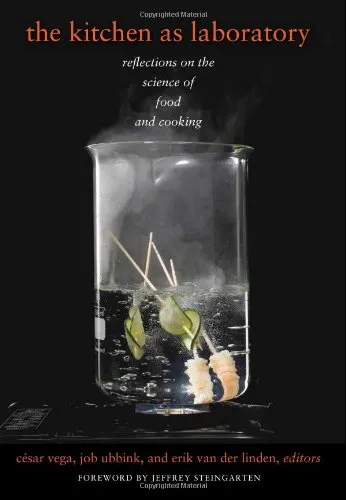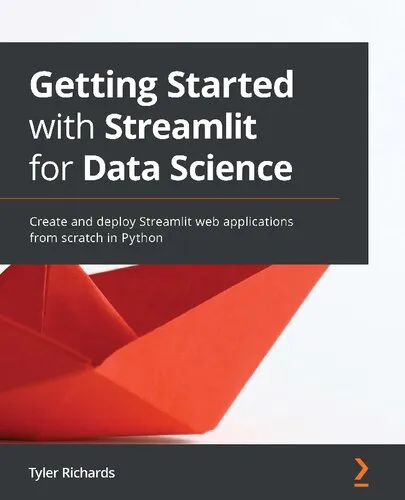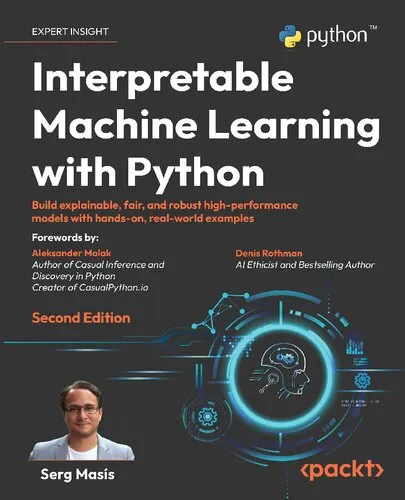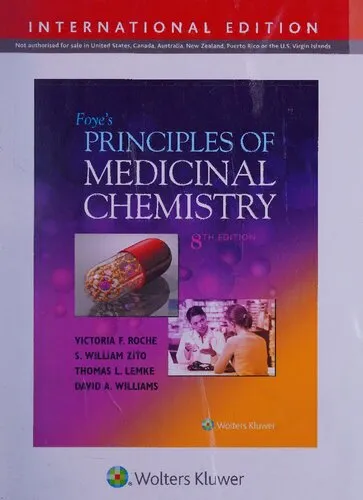The Kitchen as Laboratory: Reflections on the Science of Food and Cooking
4.4
بر اساس نظر کاربران

شما میتونید سوالاتتون در باره کتاب رو از هوش مصنوعیش بعد از ورود بپرسید
هر دانلود یا پرسش از هوش مصنوعی 2 امتیاز لازم دارد، برای بدست آوردن امتیاز رایگان، به صفحه ی راهنمای امتیازات سر بزنید و یک سری کار ارزشمند انجام بدینکتاب های مرتبط:
معرفی کتاب "The Kitchen as Laboratory: Reflections on the Science of Food and Cooking"
کتاب "The Kitchen as Laboratory" اثری است که به رابطۀ جذاب بین علم و هنر آشپزی پرداخته است. نویسندگان این کتاب، "César Vega"، "Job Ubbink"، و "Erik van der Linden"، با نگاهی علمی و خلاقانه، پرده از رازهای آشپزی مدرن برمیدارند و نشان میدهند چگونه درک فرایندهای علمی میتواند تجربهی آشپزی را به سطحی بالاتر ارتقاء دهد. این کتاب برای همه افرادی که شیفتهی دنیای آشپزی و علم هستند، منبعی بینهایت ارزشمند محسوب میشود.
خلاصهای از محتوای کتاب
"The Kitchen as Laboratory" مجموعهای از مقالات کوتاه است که توسط دانشمندان و سرآشپزان برجسته نوشته شدهاند. این کتاب به بررسی موضوعاتی از جمله اثر حرارت بر تغییر بافت مواد غذایی، نحوه تعامل مواد شیمیایی مختلف در آشپزی، و روانشناسی ادراک طعم و بو میپردازد. در این اثر، موضوعاتی مانند Emulsification، Spherification، و تأثیر آنزیمها به زبانی ساده اما دقیق و علمی توضیح داده شدهاند. در هر بخش، عناصر شیمیایی که در فرایند پختوپز نقش دارند تشریح میشوند؛ مانند نحوه تولید مِیلارد واکنش (Maillard Reaction) در کراست نان و تأثیر آن بر طعم غذا.
نکات کلیدی کتاب
- درک علمی فرایندهای آشپزی میتواند خلاقیت شما را در آشپزخانه به حداکثر برساند.
- این کتاب نشان میدهد که چگونه پختوپز ترکیبی از علم و هنر است، نه فقط یک فعالیت معمولی روزمره.
- مطالعه این اثر به خواننده کمک میکند مفهوم عوامل مانند Texture، Flavor، و Umami را بهتر درک کند.
- تکنیکهای پیشرفتهای مانند Sous Vide و الگوریتمهای علمی برای بهبود کیفیت غذا توضیح شدهاند.
نقل قولهای معروف از کتاب
"Cooking is an art, and all arts depend on technology. The better the technology, the higher the art can go."
"The combination of food science and culinary skill allows us to create new textures, flavors, and experiences unheard of in traditional cooking."
چرا این کتاب اهمیت دارد؟
این کتاب در مرز علوم غذایی و هنر آشپزی قرار دارد و به طور مستقیم نشان میدهد که آشپزخانه به عنوان یک آزمایشگاه علمی چطور عمل میکند. برای سرآشپزان حرفهای، دانشجویان علوم غذایی، و حتی آشپزهای خانگی، این اثر راهحلی الهامبخش برای شناخت عمیقتر مواد غذایی و تکنیکهای آشپزی ارائه میکند. اهمیت این کتاب در ایجاد پلی بین علوم تغذیه و هنر آشپزی است که به خوانندگان کمک میکند تا پیوند عمیقی بین علم و تجربۀ حسی خود برقرار کنند.
Introduction to "The Kitchen as Laboratory: Reflections on the Science of Food and Cooking"
Bridging the gap between the art of cooking and the science of food, The Kitchen as Laboratory offers an engaging, thought-provoking exploration of how science transforms our understanding and appreciation of cooking. Co-written by César Vega, Job Ubbink, and Erik van der Linden, this book brings together a collection of essays from food scientists, chefs, and culinary experts who unravel the scientific principles behind preparing, cooking, and enjoying food.
More than just a recipe book, this work challenges its readers to think critically about their culinary practices, illuminating the hidden dynamics and complex reactions that unfold behind every dish. The authors masterfully blend storytelling, experiments, and data to captivate food enthusiasts, chefs, and curious minds alike. With its unique structure and relatable tone, The Kitchen as Laboratory proves that science and cooking aren't just compatible—they're indispensable partners in a quest for flavor, texture, and innovation.
Detailed Summary of the Book
The book is structured as a series of essays, each written by a specialist in food science or culinary arts. It tackles topics ranging from the chemistry of flavor development to the physics of emulsions and the sensory experience of taste and smell. Readers are taken on a journey through practical examples, like why chocolate melts differently at various temperatures, how to optimize sous-vide cooking, or what roles air and water play in creating texture. The authors delve into the scientific curiosity that underpins these phenomena, helping readers understand how cooking involves more than just intuition—it’s an intricate, measurable process.
The essays are not only educational but also practical, offering nuggets of wisdom and techniques that can be applied in both home kitchens and professional culinary environments. On topics such as the Maillard reaction or the relationship between acidity and sweetness, the writers deconstruct complexities into accessible terms. The Kitchen as Laboratory thus serves as both a scientific primer and a hands-on guide to elevating culinary expertise.
Key Takeaways
- Cooking is a blend of art, science, and creativity, all working together to produce extraordinary sensory experiences.
- Understanding the scientific principles behind food allows for greater precision, consistency, and innovation in the kitchen.
- Simple everyday practices, like boiling pasta or whipping cream, are regulated by techniques that rely on chemistry and physics.
- A small change in variables like time, temperature, or pH can have profound effects on a dish's final outcome.
- Collaboration between scientists and chefs can revolutionize culinary possibilities, pushing boundaries while maintaining respect for tradition.
Famous Quotes from the Book
"The kitchen is not just a place to cook. It is a laboratory where imagination, creativity, and science converge."
"Cooking is a thoughtful dance between understanding ingredients and controlling processes."
"Being a good cook is not just about following recipes—it's about learning the why behind every technique."
Why This Book Matters
The Kitchen as Laboratory matters because it empowers both amateur cooks and seasoned chefs to rethink food preparation through the lens of science. In a world where culinary experimentation is shaping gastronomy, this book offers the knowledge to creatively tackle challenges in the kitchen. By opening the door to food science, it pushes boundaries and expands perspectives, equipping readers with the tools to succeed in the ever-evolving culinary landscape.
This compilation of essays also serves as a celebration of curious minds—chefs asking “why” and translating those answers into delicious experiences. Beyond the kitchen, the book encourages lifelong learning by emphasizing the importance of mixing creativity with a thirst for understanding. It stands as a monument to the idea that food is not just sustenance, but an evolving dialogue between science, culture, and the human experience.
دانلود رایگان مستقیم
شما میتونید سوالاتتون در باره کتاب رو از هوش مصنوعیش بعد از ورود بپرسید
دسترسی به کتابها از طریق پلتفرمهای قانونی و کتابخانههای عمومی نه تنها از حقوق نویسندگان و ناشران حمایت میکند، بلکه به پایداری فرهنگ کتابخوانی نیز کمک میرساند. پیش از دانلود، لحظهای به بررسی این گزینهها فکر کنید.
این کتاب رو در پلتفرم های دیگه ببینید
WorldCat به شما کمک میکنه تا کتاب ها رو در کتابخانه های سراسر دنیا پیدا کنید
امتیازها، نظرات تخصصی و صحبت ها درباره کتاب را در Goodreads ببینید
کتابهای کمیاب یا دست دوم را در AbeBooks پیدا کنید و بخرید
1119
بازدید4.4
امتیاز0
نظر98%
رضایتنظرات:
4.4
بر اساس 0 نظر کاربران
Questions & Answers
Ask questions about this book or help others by answering
No questions yet. Be the first to ask!






![The Ultimate iOS Interview Playbook: Conquer Swift, frameworks, design patterns, and app architecture [Team-IRA]](https://s3.refhub.ir/images/thumb/The_Ultimate_iOS_Interview_Playbook__Conquer__29925.webp)







